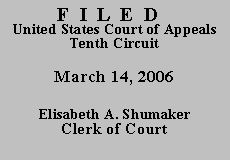

| RAYMOND C. PERSIK,
Plaintiff-Appellant, v. KEN SALAZAR; PHILLIP B.J. REID, Special Agent in Charge, Federal Bureau of Investigation - Denver Division, Defendants-Appellees. |
|
Mr. Persik presents three appellate issues. First, he contends that he is entitled to mandamus relief "as a representative of the American people," Aplt. Opening Br. at 8, to compel the defendants named in this case to provide him with redress "for the nearly seven years of inhumane treatment that he allegedly suffered while a resident of the State of Colorado," id. at 9, to require them to consider "security holes within the United States Department of Justice and U.S. Military Installations," id., and to redress violations of international treaties. Second, he contends that the district court erred in concluding that his proposed second amended complaint did not comply with Rule 8(a). Finally, he asserts that the district court failed to accept "the well-plead[ed] allegations in [his] complaint" and to construe them "in a light most favorable to the non-moving party." Aplt. Opening Br. at 12.
We review de novo the district court's dismissal of an action under Fed. R. Civ. P. 12(b)(6) for failure to state a claim. Beck v. City of Muskogee Police Dept., 195 F.3d 553, 556 (10th Cir. 1999). We construe broadly the allegations of a pro se complaint. Hall v. Belmon, 935 F.2d 1106, 1110 (10th Cir. 1991). Dismissals under Rule 8(a) are reviewed for an abuse of discretion. Kuehl v. FDIC, 8 F.3d 905, 908 (1st Cir. 1993). We also review the district court's denial of leave to amend a complaint for an abuse of discretion. Merida Delgado v. Gonzales, 428 F.3d 916, 921 (10th Cir. 2005).
Having considered the briefs, the record, and the applicable law in light of the above-mentioned standards, we AFFIRM the dismissal of Mr. Persik's complaint and the denial of leave to amend for substantially the reasons stated in the district court's order of April 15, 2005.
Entered for the Court
Circuit Judge
*. After examining the briefs and appellate record, this panel has determined unanimously that oral argument would not materially assist the determination of this appeal. See Fed. R. App. P. 34(a)(2); 10th Cir. R. 34.1(G). The case is therefore ordered submitted without oral argument. This order and judgment is not binding precedent, except under the doctrines of law of the case, res judicata, and collateral estoppel. The court generally disfavors the citation of orders and judgments; nevertheless, an order and judgment may be cited under the terms and conditions of 10th Cir. R. 36.3.